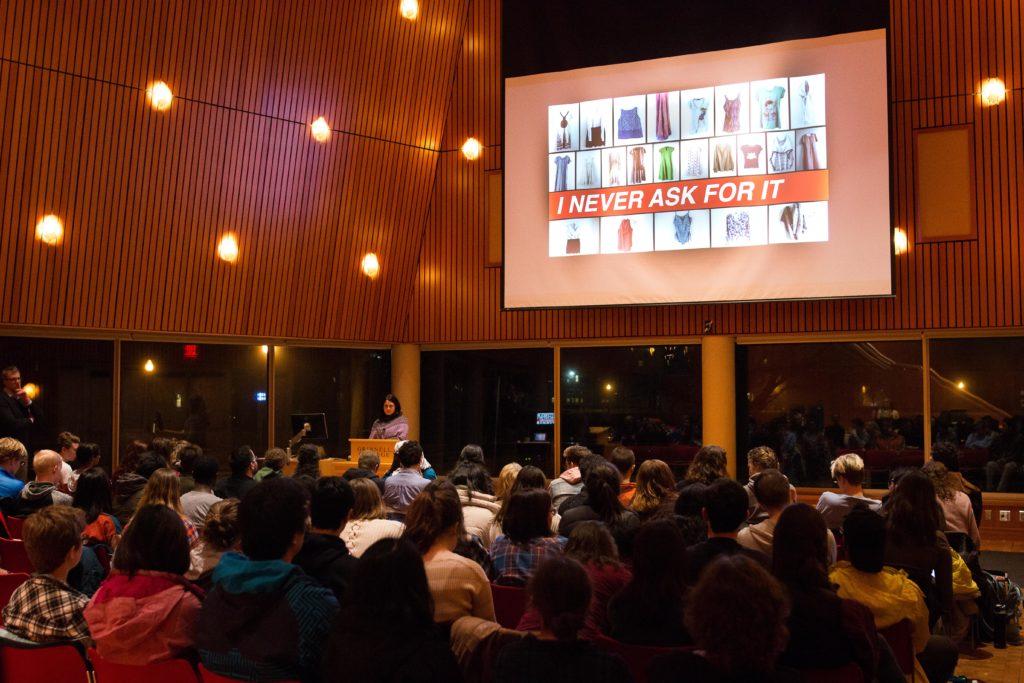Jasmeen Patheja is the founder and facilitator of Blank Noise, a community of activists, termed “Action Heroes,” who are fighting to make collective change against gender-based and sexual violence in India and around the world, according to the Blank Noise site. Patheja visited campus this past week to talk about her work with Blank Noise.
Since the first time she experienced street harassment outside Srishti, a university in Bangalore, India in 2003, Jasmeen Patheja was determined to make a change in the way women are treated in public spaces.
Patheja began by taking photos of men who had harassed her and posting them online.
“That is where the first community started getting built,” she said.
After receiving support through her blogging community, Patheja described a “snowball effect” as one step led to the next, the community expanded and others helped to spread the word.
This project was not launched without pushback, however. Patheja explained that at first, some classmates brushed off street harassment as “not a big deal,” saying that “boys are like that,” or even that she should “focus on more serious issues” in response to her discomfort at being stalked, groped, stared at and nudged in public spaces.
Still, Patheja had a large group of support within the Blank Noise community, as well as university faculty who helped her get the project up and running.
The Blank Noise community has launched a number of projects encouraging women to not be afraid in public spaces. Some of the projects have been “Being Idle,” in which Action Heroes stood in public and were encouraged to make eye contact and not be afraid of the consequences, as well as “Meet to Sleep,” in which Action Heroes slept in a public park.
“Through collective action … [the goal of these projects] is really about unlearning fear,” Patheja said. Traditionally, women are taught to walk as fast as they can and avoid eye contact in public spaces. Blank Noise has been revolutionary in challenging those norms.
Patheja acknowledges that these actions do not come without possible dangers, which make them so boundary-pushing in the first place. To combat potential harm, Patheja said that with all Blank Noise projects, participants “negotiate fear in their own way,” and that people can take action at their own pace.
“We can’t assume everyone is in the same place. What we can assume … is that there is something still connecting us” Patheja said. While they do not offer crisis intervention, Patheja stresses that the community does offer a network of support between one another.
Blank Noise gained even more ground after a tragic incident in December of 2012, when a female medical student was gang raped and murdered on her way home from the movies in Delhi.
Patheja said that the incident “forced and enabled a lot of conversation,” which marked a significant shift in public conscience and in the conversation on harassment.
Regarding the evolution of her own beliefs, Patheja said that while at first her experiences with harassment seemed personal, she has contextualized them through her work at Blank Noise.
“I’m experiencing it, which is valid, but I’m also learning to see it as something that is systemic.”
Blank Noise itself is also becoming more intersectional, as women across all identities experience harassment.
As a question to students at Grinnell, Patheja asked, “How can you contribute to a safe space?” Argued that while it is easy to believe it is someone else’s responsibility, each person has a role in building a safe campus.
On a broader scope, on June 16, Blank Noise is facilitating a “Meet to Sleep” event where anyone can participate in taking naps in public parks across the world. An advertisement for the event read:
“Sleep. Alone. Together. We sleep to fight fear, through trust and belonging. In sleep we assert our right to be defenseless. In sleep we protest.”
Patheja’s visit serves as a reminder of the fact that everyone can take steps to better our campus environment. As Patheja said, “Everyone has the ability to influence public space.”

























































